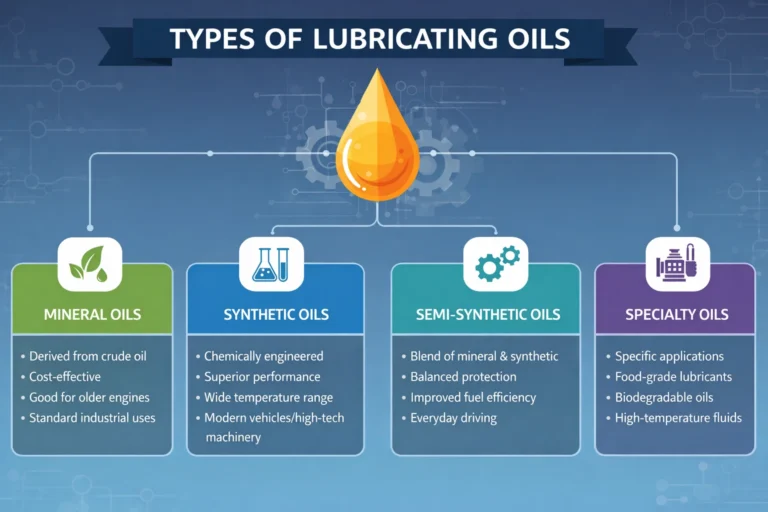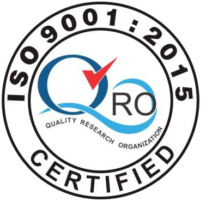1. Introduction
In today’s industrial and automotive world, choosing the correct type of lubricating oil is no longer just a technical detail—it’s a key factor in performance, reliability and cost-control. With established companies like HPCL offering a wide range of lubricants, it makes sense to understand the different types, how they work, and how to pick the right one.
2. Why Lubricating Oil Matters
Lubricating oils do far more than simply reduce friction: they help control heat, reduce wear, prevent contamination, support sealing and insulation, and extend equipment life. When the wrong oil is used (or maintenance is neglected), downtime, repair costs and failure rates rise.
As an example, HPCL states they market more than 350 grades of lubricants and specialty items. hpcl-lube.co.in+2moneycontrol.com+2 That breadth underlines how varied the needs are across industries and machines.
3. Overview of HPCL’s Lubricating Oil Portfolio
HPCL, under its brand umbrella “HP Lubricants”, covers automotive, industrial, speciality, marine and grease lines. hplubricants.in+1
For industrial oils specifically, product lists show lines like Enklo (hydraulic, circulating), “industrial gearbox oils” etc. lubeoilcompany.com+1
Knowing this helps anchor the discussion of “types” in a brand-context.
4. Types of Lubricating Oil
Here we break down major categories so you can see what each type is for, how it differs, and what HPCL offers.
4.1 Engine Oils
These oils are used in internal-combustion engines (petrol, diesel, natural gas). They handle extreme temperature cycles, soot, acid formation, high shear, etc.
HPCL’s automotive catalogue includes engine oils such as the “HP Milcy” series and synthetic ranges. hpcl-lube.co.in+1
Although primarily automotive, the same core principles (viscosity, additives, base oil) apply in many industrial engines.
4.2 Gear Oils & Transmission Oils
Gear oils are formulated to protect meshing gears under heavy loads, sliding and rolling contact, and sometimes shock loads.
HPCL has content explaining gear oil grades, viscosity and applications (“A Complete Guide to Gear Oil Grades”). hpcl-lube.co.in
Gear/transmission oil considerations include viscosity, EP (extreme pressure) additives, sliding vs rolling contact, and gear geometry (spur, helical, hypoid, worm).
When you choose a gear oil from a brand like HPCL, you’ll find grades tailored for heavy-duty industrial gearboxes as well as automotive differentials.
4.3 Hydraulic & Circulating Oils
Hydraulic systems, circulating oil systems, bearings, gearboxes with external lubrication—these all use oils that must manage heat, contaminants, shear, and fluid stability over time.
HPCL lists industrial hydraulic oils under its “Enklo” range: e.g., Enklo 46, 68, FRDU, HVLP etc. lubeoilcompany.com+1
These oils often need good cleanliness, anti-wear properties, foam control, aeration resistance and oxidation stability.
4.4 Turbine & Turbomachinery Oils
For steam, gas or hydraulic turbines and high-speed machinery, the lubricant must resist oxidation, resist deposit/varnish formation, ensure good demulsibility and extend service life.
HPCL’s data sheet mentions “TURBINOL 32, 46, 57, 68, 77” grades and indicates these oils are made from high-quality paraffinic base stocks with antioxidants, rust inhibitors and antifoam agents. brightenterprises.net
These oils are critical in power plants, large compressors, etc.
4.5 Specialty & Grease Products
Beyond “standard” oils, there are specialty lubricants and greases for extreme temperature, food-grade, hydraulic fluids with fire-resistance, compressor oil, gear oil with unique additives, etc.
HPCL lists specialties, greases and industrial oils under its portfolio. hplubricants.in+1
For example, greases might be lithium based, Ca complex, high-temperature, etc. Specialty oils may include metal-working fluids, process oils, quenching oils etc.
5. How to Choose the Right Lubricating Oil
Here are key factors to evaluate when selecting:
-
Viscosity and grade: Check what the equipment manufacturer recommends. For gear oils, HPCL provides a guide to different grades and explains SAE vs API vs ISO systems. hpcl-lube.co.in
-
Additives and base oil quality: Synthetic base oils, extreme pressure additives, anti-oxidants, corrosion inhibitors—these matter especially for demanding applications.
-
Application and load: Is the machine under heavy load, shock loads, sliding gears (hypoid), worm gears, high speeds or high temperatures?
-
Environmental conditions: Temperature extremes, contamination levels, moisture, dust—all influence oil choice and life.
-
Maintenance practices: Oil change interval, oil cleanliness, filtration, monitoring condition. A great oil won’t deliver if maintenance is poor.
-
Brand and support: A known brand like HPCL gives you technical data, approved grades, large portfolio and support network.
6. Best Practices for Maintenance & Oil Life
Maximizing value from your lubricating oil means not just picking the right oil, but maintaining it:
-
Establish oil analysis/monitoring regimes: Check viscosity, acid number, wear metals, contamination.
-
Keep oil cleanliness high: Filtration, breathers, proper storage.
-
Monitor temperature, loads and duty cycle: High temps accelerate oil degradation.
-
Use correct oil change intervals based on actual operating conditions—not just generic time-based intervals.
-
Store fresh oil properly (dry, clean environment), ensure correct transfer procedures to avoid contamination.
-
Use genuine products from trusted brands to ensure specification compliance.
7. Why HPCL is a Strong Choice
Here’s why many choose HPCL for lubricating oils:
-
HPCL claims to produce over 40% of India’s total lube base oil production via its large lube refinery. hplubricants.in
-
With “more than 350 grades” (or even 450+ grades per some sources) covering industrial, automotive, specialty oils, HPCL has a broad portfolio. cvforum.in+1
-
They provide industrial oil solutions (via its “Industrial Oils” range) as well as automotive ones, meaning you can often standardize across your site.
-
Technical data and product sheets are available (see HPCL data sheets).
-
Strong distribution and service network in India supports availability and after-sales.
8. Conclusion
Selecting the correct type of lubricating oil is strategic, not just a routine purchase. Whether you’re dealing with engines, gearboxes, hydraulic systems or turbines, understanding the categories and factors ensures longer service life, fewer failures and better cost efficiency. Brands like HPCL with broad portfolios and technical backing make it easier to match the right oil to the job.
Regular maintenance, monitoring and proper selection amplify the benefits of a good lubricant. In short: the right oil + good practices = better reliability, lower downtime, and reduced lifetime costs.
9. Further Reading / External Links
-
HPCL – “What is Gear Oil: A Complete Guide to Gear Oil Grades” – hpcl-lube.co.in hpcl-lube.co.in
-
HPCL – About HP Lubricants and their industrial oil portfolio – hpcl-lube.co.in hpcl-lube.co.in+1
-
HPCL – Product data sheet for turbine oils – brightenterprises.net brightenterprises.net
-
HPCL – Company overview and lubricant production capacity – hindustanpetroleum.com hplubricants.in
-
Moneycontrol – HPCL to carve out lubricants business (industry insight) – moneycontrol.com moneycontrol.com




